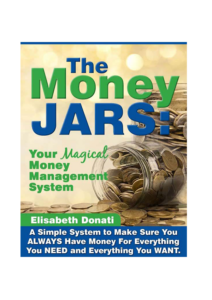Financial Education: Fact or Fiction
In 2001, a young woman started questioning her lack of financial education as she looked around and saw so many WITH money but even more WITHOUT.
She didn’t understand how she’d gotten mostly A’s in high school and college, knew how to grow freezers and pantries full of food, take care of horses, build houses and come up with practical, logical solutions to almost anything but didn’t understand how to have more than enough money than she needed to live on each month.
She started asking, Why? She started looking around at the world, wondering what she had missed. And then, upon the pages of a book that was given to her by a friend, she found the answer…and the answer was simple. She didn’t understand money because no one had ever taught her about money.
Now, truth be told, she still doesn’t ‘understand’ money any more than the next guy because money is one of the most nebulous substances in the galaxy, but she has learned how to make it, save it, invest it so that it multiples, create passive income streams and more. But the best part of this story is that in the process of teaching herself what she never learned as a kid, she created a way to teach kids and adults about money in the most amazingly sticky, effective, relevant way…with a game bearing the name of the nebulous stuff itself…The Money Game.
Financial Education: Right or Privilege
If a child decides he or she wants to learn how to swim, or play the flute or become the best pitcher around, that child’s parent, if they have the financial resources to do so, goes in search of a coach or teacher for the child. This coach or teacher generally charges a fee for providing his or her expertise and the parent agrees to pay the fee in exchange for the coach or teacher to impart their knowledge and skill upon said child.
Now let’s change the topic of consideration to money. When it comes to teaching our children about money, helping them gain the skills necessary to be good at handling their financial affairs as an adult, many parents, and most of America, thinks this should be provided free.
Again, this woman (not so young anymore) asks, Why? Why is it perfectly acceptable to expect to pay for flute or swimming lessons but not money lessons? Why is it OK that for-profit companies make millions of dollars a year by selling textbooks and curriculums to school on math and science and reading but when it comes to getting the highest quality financial literacy curriculum into the schools, a for-profit company is looked down upon because it’s not a nonprofit organization?
What the heck is wrong with this situation? Why on earth is it not OK for a for-profit company to teach financial education but OK for a for-profit company to provide math or reading or science programs?
The reasons behind this go deeper than you’d ever care to consider and deeper than I am able to communicate and put into words at this point. It’s along the same lines as the spam filters who have been trained to mark emails and subject lines containing the terms money and f.ree (like THAT works to get past them…NOT:-) as spam and make it undeliverable.
Is there a plot? Maybe. I, being the women in the story above, have always questioned whether the government REALLY wants us educated in financial matters. It’s so much easier to slide things by us, make things seem like they make sense financially, keep society as a whole making decisions from a context of greed, need, deprivation or desire instead of financial security, common sense and genuine desire if we just don’t understand money.
Here’s an interesting quote by Emma Goldman: The most violent element in society is ignorance.
I couldn’t agree more. And ergo my question about whether financial education is a human being’s right or if it’s only a privilege to those who’s parents are aware enough to make sure they learn about money or eventually grow up and teach themself.
If you thought I’d have an answer to this dilemma, I’m afraid at present I don’t. But I did want you to think on it and share those thought with me for further discussion…and I believe it warrants a lot more discussion.
Just something else to think about…





Elizabeth,
Great post! I think we recently had a discussion along these same lines. I believe that one of the main reasons that financial education is not “the norm” is that it is just expected that it’s part of everyday life; that we will all learn through our own experiences just as generations before us have. But, here are a few additional thoughts:
1. The world of personal finance is SOOOO much more sophisticated and complex than it was even 20-25 years ago and the cost of living hasn’t kept pace with incomes [well, most incomes 🙂 ]. So, some of the need for more education has crept up on the very generation that is now parenting the next generation. And, remember, at one time, only the very wealthy class, who dominated the biz world, had true investments.
2. The use/study of money has never been viewed as something to be “mastered” like sports, school (academics), music, arts or whatever unless you had a finance-related major or a career path (banking, etc). So, for the average person, money has just been a by-product of our lives. It’s not so different from society’s expectation that women are just “naturally” inclined to know how do domestic chores and childcare. But, as mothers have been speaking out about this, support structures have been created in droves (blogs, outsourcing of tasks, etc). So, until something is considered “worthy” of being mastered by society, it doesn’t usually garner the attention of the masses.
3. Could it be that all the other topics you mention (learning to swim, play the flute or becoming the best pitcher) are actual activities (usually pleasurable or stimulating) that humans enjoy versus the topic of money, which is just the tool to those other activities? But, those activities aren’t rights, their privileges. So, is financial education a right or a privilege? I tent to think it’s a right. But, not everyone is privy to all their rights – depending on their circumstances, environment, etc. It’s also about choices – one can choose to take their education seriously or they can choose to drop-out. (as evidenced by those who’ve grown up in the “ghetto” and have triumphed over poverty). And, lastly, IF people want and/or demand financial education, they can petition for it or seek it out for themselves. But, as we teach in Camp Millionaire, “You don’t know what you don’t know”. So, how can you ask for something you don’t know you need? … Wait…once the “masses” decide it’s a “the” thing, then suddenly everyone wants a part of it.
Great comment and great questions. Love it!!!
Great ponderable point you bring up E. Like you I have had to teach myself about money–I’m still doing it in fact at midlife. Would that I had had some sort of direction, coaching, teaching throughout my school years on the subject I’d have saved lots of losses, time, frustration, oh, and money!
It’s absurd to think that educating people “ought” to be free on any subject. Not to mention the concept of paying for something so we have some skin in the game usually creates better results. I say we teach as much as we can and then we go out and find the best teachers if we need or want to master a subject. And in terms of mastering life skills, mastering the money game is tantamount to living a successful life and one that can benefit others locally and globally.
Yes! The Game of Money is so important…as is training in relationships and communication and business and….
Thanks so much for the comment and what YOU are doing, also. It’s all about helping each other enjoy our lives more. Because in the end? That’s all there really is.